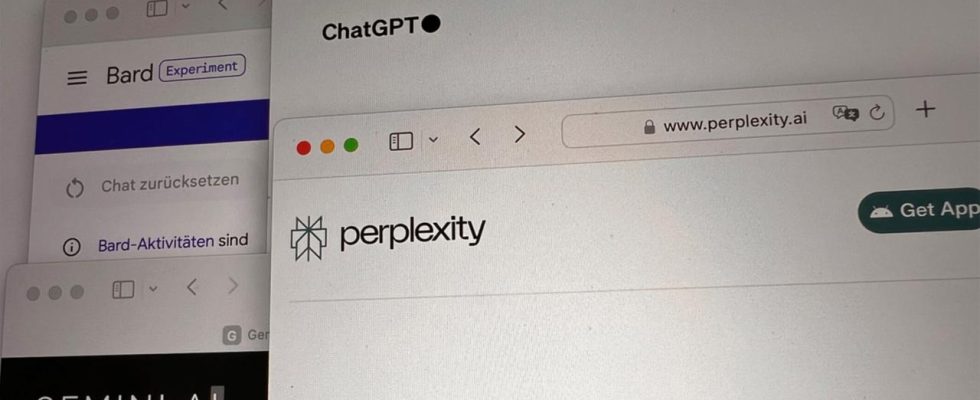background
The text robot ChatGPT from Microsoft and OpenAI was the beginning. In the meantime, the competition has brought additional products onto the market that work with artificial intelligence. An overview.
Anyone who wants to play a role in the computer world in the future can no longer avoid artificial intelligence (AI). If you react too late, you can quickly fall behind. Meta, Google, Microsoft: Everyone is therefore working on the development of chatbots and so-called generative AI models.
Artificial intelligence is capable of performing tasks that normally require human intelligence – such as learning, solving problems or making decisions. In recent years there has been a sharp increase in research and development in AI. This has led to a number of new AI systems that can perform a variety of tasks.
Pioneer ChatGPT
The pioneer in the field of AI is OpenAI, the company behind ChatGPT, which was founded in 2015. The big breakthrough came in November 2022: One million users worldwide registered within five days after OpenAI made the software version GPT-3 available to the public free of charge.
“The entire Silicon Valley knows: AI is ‘the next big thing’, and as a company you have to be one step ahead,” says ARD-Internet expert Jörg Schieb, who deals with AI in detail in his current book “The Digital Shock”.
That’s why the competition is now trying to catch up. “Google is particularly affected because the company actually has a considerable history in AI – and also know-how. After all, Google has built AI models that play chess or Go better than the best humans,” says Schieb. Google also wants to defend its market dominance in search services.
Google wants to catch up with Bard
This is where Bard comes in, the AI chatbot that Google introduced in July. Just like OpenAI’s ChatGPT, Bard is a chat tool designed to provide human-like answers. Google initially hoped to benefit because Bard can retrieve answers from the Internet and is integrated into the Google search engine, while ChatGPT’s answers so far have come from a huge knowledge base limited to information before September 2021.
However, OpenAI recently pointed out on Platform X that ChatGPT now also has access to the Internet. In addition, answers are now supplemented with links to the sources.
In contrast to ChatGPT, Bard offers different answer options, while ChatGPT only produces one answer. ChatGPT can remember previous conversations, while Bard’s ability to remember context is currently limited. “Google Bard is clearly designed so that the chatbot serves as a perfect complement to the search engine,” says Schieb. However, ChatGPT has so far been able to generate independent texts much better, such as poems, book texts, term papers or even moderations for programs.
Gemini with five times the computing power
According to ARD-Expert Schieb has enormous pressure on Google. “As the industry leader, Google is expected to be ahead. That’s why Google is currently developing another chatbot called Gemini, which will have five times more computing power than ChatGPT.”
Gemini is currently still being tested in companies. Gemini can also generate images and text that is optimally tailored to the needs of users, such as message texts or emails. While Bard is designed for answering questions, Gemini is an AI assistant for automating tasks. As is already the case with Bard, Gemini will also be deeply anchored in existing Google products such as Gmail or YouTube.
Perplexity more accurate than ChatGPT
With Perplexity, even more artificial intelligence is coming onto the market to compete with Google and ChatGPT. Perplexity basically works very similarly to ChatGPT and was developed by former OpenAI programmers. “However, Perplexity also names sources and even links to them in the answers. Perplexity is generally more accurate than ChatGPT, especially when creating text that contains facts or factual information,” says Schieb, explaining the differences. The disadvantage is that Perplexity is often more expensive than ChatGPT for corporate use.
Which system the user ideally uses depends on their individual needs and requirements. If you are looking for a chatbot that can entertain and educate, ChaptGPT is a good choice. Bard is more of a knowledge base system that can answer questions in an informative way. Perplexity is most likely a text generator that helps create creative content. And if you want an AI assistant that helps automate tasks, Gemini is the best choice.
However, all artificial intelligence systems have a common problem. You expend enormous amounts of energy during the training phase. “The training of ChatGPT3, the predecessor of the current ChatGPT, is said to have consumed 1,300 megawatt hours of electricity. The development of ChatGPT cost 4.6 million dollars – mainly for the electricity,” calculates Schieb. ChatGPT’s operating costs will then amount to at least $700,000 per day.

